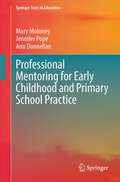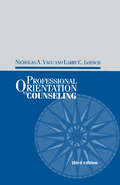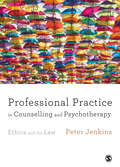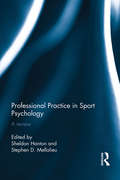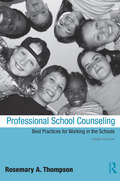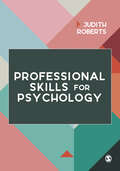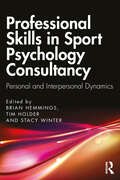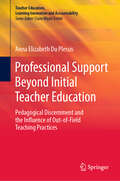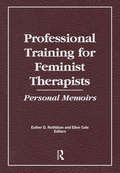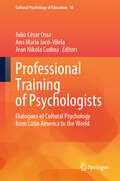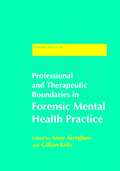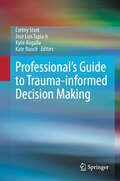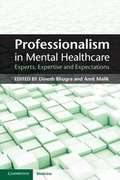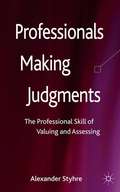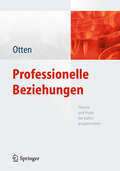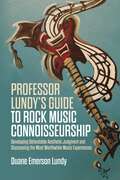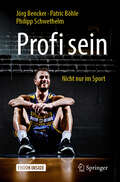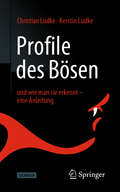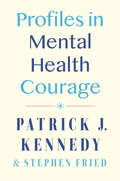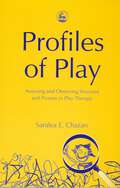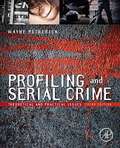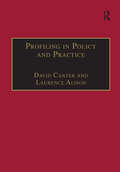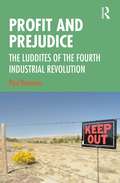- Table View
- List View
Professional Mentoring for Early Childhood and Primary School Practice (Springer Texts in Education)
by Mary Moloney Jennifer Pope Ann DonnellanInformed by current theory and practice, this book adapts a practical approach to mentoring that is grounded in real life experiences. Written in an accessible style, it explores the key concepts, characteristics and considerations of mentoring and mentoring relationships in early childhood and primary education contexts. With a focus upon mentoring as it applies to practicum during initial teacher education, as well as teacher induction, different models and approaches to mentoring, including dyads, triads, peer mentoring, critical friends and communities of practice (CoP) are introduced and evaluated. Engaging with theory, practical scenarios, key learning and reflection points throughout, the book invites the reader to reflect on the mentoring process from different perspectives to build the critical skills required by mentors and mentees alike, to create or enhance a culture of mentoring within their organisation. Written from the perspective of both mentors and mentees, the book is a valuable resource for those in the Further and Higher education sectors, as well as early childhood and school-based mentors. It is relevant to experienced mentors, who may wish to affirm their existing approach to mentoring, or want to explore, discover and embrace new and improved ways of working with a mentee. This book is also essential reading for anyone interested in mentoring, providing a wealth of information, insights and effective strategies for those who may be thinking of undertaking a mentoring role.
Professional Orientation to Counseling
by Nicholas Vacc Larry C. LoeschFirst published in 2001. Routledge is an imprint of Taylor & Francis, an informa company.
Professional Practice in Counselling and Psychotherapy: Ethics and the Law
by Peter JenkinsDeveloping and maintaining a secure framework for professional practice is a core part of any counselling and psychotherapy training, as all therapists need to understand the key values, ethics and laws that underpin the profession today. But what does being a member of a 'profession’ actually mean, and what does being a ‘professional’ actually involve? Structured around the BACP Core Curriculum, and with the help of exercises, case studies and tips for further reading, this book covers everything from the requirements of the BACP Ethical Framework to broader perspectives on good professional practice. It includes: Practising as a therapist in different roles and organizational contexts. Working with key issues, including difference, vulnerable clients and risk. Understanding the law and relevant legal frameworks for practice. Working ethically, including contrasting models and approaches to ethics.
Professional Practice in Counselling and Psychotherapy: Ethics and the Law
by Peter JenkinsDeveloping and maintaining a secure framework for professional practice is a core part of any counselling and psychotherapy training, as all therapists need to understand the key values, ethics and laws that underpin the profession today. But what does being a member of a ′profession’ actually mean, and what does being a ‘professional’ actually involve? Structured around the BACP Core Curriculum, and with the help of exercises, case studies and tips for further reading, this book covers everything from the requirements of the BACP Ethical Framework to broader perspectives on good professional practice. It includes: Practising as a therapist in different roles and organizational contexts. Working with key issues, including difference, vulnerable clients and risk. Understanding the law and relevant legal frameworks for practice. Working ethically, including contrasting models and approaches to ethics.
Professional Practice in Sport Psychology: A review
by Sheldon Hanton Stephen D. MellalieuSport psychologists working with athletes, teams and sports performers are only as effective as their professional techniques and competencies will allow. This is the first book to offer a detailed and critical appraisal of the conceptual foundations of contemporary professional practice in sport psychology. The book presents a series of reviews of the most up-to-date academic and professional literature on professional practice, exploring issues that all psychologists face when working with clients in sport and offers important evidence-based recommendations for best practice. Key topics covered include: models of practice and service delivery counselling and clinical intervention working with teams working with young performers providing life skills training managing career transitions working with special populations enhancing coach-athlete relations. With contributions from leading sport psychology consultants in the UK, the US, Canada, Australia and continental Europe, this is a comprehensive and thought-provoking resource that bridges the gap between research and application. It is vital reading for all advanced students, researchers and professionals working in sport psychology.
Professional School Counseling: Best Practices for Working in the Schools, Third Edition
by Rosemary A Thompson Dr. Rosemary ThompsonToday’s children and adolescents are constantly facing new and unique challenges, and school counselors must respond to this by expanding their role and function within the schools. This revised and expanded edition of Thompson’s important text explores these issues, as well as the necessary steps school counselors need to take in order to adapt and effectively deal with them. Thompson advocates for the need for standards-based school counseling, outlining the framework and benefits of the ASCA National Model® and comprehensive guidance and counseling programs. She addresses the newest research in implementing evidence-based practices; the mental health issues that may be faced by children and adolescents; consulting with teachers, parents, administrators, and the community; and crisis intervention and management. New to this edition are chapters that focus on minority and disenfracnshised students and emphasize the need for school counselors to be able to advocate, coordinate, and collaborate on services for these students and their families. This is an essential resource for every school counselor in a time when the profession is becoming increasingly important.
Professional Skills for Psychology
by Judith RobertsProfessional Skills for Psychology covers key professional, ethical and career development issues. Whether you′re a student or a professional, this book provides you with a thorough grounding in how to develop a successful career in psychology. Written by the module leader of ‘Professional Skills in Psychology’ at Bangor University, and with a strong focus on practical skills, each chapter includes case studies with a range of scenarios, allowing you to consolidate the key points covered. From leadership to working in teams, and from equality and diversity to practitioner resilience, this book is essential reading for anyone considering a career in practitioner psychology, or for practitioners seeking to nurture their skills. Judith Roberts is a HCPC registered Clinical Psychologist with over 20 years’ experience of working in Health and Social Care.
Professional Skills for Psychology
by Judith RobertsProfessional Skills for Psychology covers key professional, ethical and career development issues. Whether you′re a student or a professional, this book provides you with a thorough grounding in how to develop a successful career in psychology. Written by the module leader of ‘Professional Skills in Psychology’ at Bangor University, and with a strong focus on practical skills, each chapter includes case studies with a range of scenarios, allowing you to consolidate the key points covered. From leadership to working in teams, and from equality and diversity to practitioner resilience, this book is essential reading for anyone considering a career in practitioner psychology, or for practitioners seeking to nurture their skills. Judith Roberts is a HCPC registered Clinical Psychologist with over 20 years’ experience of working in Health and Social Care.
Professional Skills in Sport Psychology Consultancy: Personal and Interpersonal Dynamics
by Brian Hemmings Tim Holder Stacy WinterProfessional Skills in Sport Psychology Consultancy raises awareness of intrapersonal and interpersonal professional practice skills. The book chapters focus on the aspiring practitioner’s personal and professional development when working with all kinds of recipients of psychological support in sport including individual athletes, teams, coaches, parents, and administrators.Organized in two sections – intrapersonal processes and interpersonal dynamics – this new book steers readers through the many subtle and complex factors that impact on the professional relationships that ultimately influence successful outcomes and provides guidance for students, researchers, and practitioners about the many intrapersonal and interpersonal processes involved in the working alliance, professional relationship, and sport psychology consultancy.Professional Skills in Sport Psychology Consultancy is a core text for upper-level undergraduate and postgraduate sport psychology students, sport psychologists undergoing professional training, and early career sport psychologists.
Professional Support Beyond Initial Teacher Education: Pedagogical Discernment and the Influence of Out-of-Field Teaching Practices (Teacher Education, Learning Innovation and Accountability)
by Anna Elizabeth Du PlessisThis book investigates the professional learning needs of teachers beyond initial teacher education, focusing on teachers in complex teaching positions, such as out-of-field teaching practices. The information presented here will help to improve professional learning strategies, while also offering an in-depth understanding of teachers’ needs, leaders’ perceptions, and what complex teaching situations mean for teachers’ professional learning and development. Further, Du Plessis shares the perceptions and lived experiences of teachers, parents, leaders and students as key stakeholders in quality teaching and learning environments.In light of new evidence-informed findings on the out-of-field phenomenon and continuing professional learning, Du Plessis puts forward strategies that will enhance the effectiveness of professional learning and development programs, while also fostering improved decision-making and policy development. In brief, Du Plessis focuses on the impact that complex teaching situations have on teachers’ unique needs, the support that is provided, and the influence of the out-of-field phenomenon on teachers’ responses to continuing professional learning and development programs.
Professional Training for Feminist Therapists: Personal Memoirs
by Ellen Cole Esther D RothblumHere is a unique collection of personal memoirs from feminist therapists which provides a revealing look at their professional training experiences. This superb volume offers a rare glimpse at the struggles of these women, both as therapists and feminists, as they continue to develop professionally while maintaining their own identities. These candid accounts clearly recount the realities of professional training for the feminist therapist as a combination of painful memories, active struggle, impromptu friendship, and humor. The stories comprising this extraordinary volume cover several decades, ranging from the experiences of therapists trained in the 1930s to those of women currently undergoing therapy training.Share the trials and triumphs of these seventeen women who faced professional, personal, and ethical challenges during their professional therapy training. Read about the variety of experiences in the heterogeneous group of feminist therapists who describe the circumstances of their training including the account of mother and daughter therapists who compare their training of the 1930s and the 1970s; that of one woman who entered graduate school in the 1950s and was prohibited from specializing solely in research; one woman whose teaching was sabotaged by the “old boy” network; one woman’s experience of coming out as a lesbian in medical school during a psychiatric residency program; one therapist’s double minority status as female and Japanese-American; a Black student’s confrontation with the alienation and invisibility of her presence in an all-white classroom; and a first-year graduate student who describes her transition from a women’s studies undergraduate focus to a traditional male-dominated research institution.Students and instructors in clinical psychology, counseling, and social work will find the accounts in Professional Training for Feminist Therapists: Personal Memoirs a valuable resource for exploring the experiences of women in professional training for feminist therapy. Established therapists will value this work for the clarity and insight that comes from reflection, as will women who undergo professional training in future generations.
Professional Training of Psychologists: Dialogues of Cultural Psychology from Latin America to the World (Cultural Psychology of Education #18)
by Julio César Ossa Ana Maria Jacó-Vilela Jean Nikola CudinaThis book represents an intellectual journey through the history, culture, and training of psychologists in Latin America to transcend borders. It analyzes the inception of academic programs in each country in the region, exploring the socio-political and economic context, and delves into the conceptual, methodological, and epistemological aspects of training. Similarly, it discusses how psychology prepares professionals for their roles in society and provides updated data on the discipline's growth in the region. Furthermore, it promotes international and intercultural dialogue, enriching the global understanding of psychology. The book's emphasis on adopting a historical and cultural approach is essentially an effort to introduce a critical component to the analysis of psychologist professional training. This component adds value for the reader and aids in understanding how Latin American psychology has been shaped by historical events, social movements, government policies,and the diverse cultural traditions of the region. Readers will gain a profound understanding of why psychology has developed in a particular way in each Latin American country, shedding light on significant variations in psychological practice and theory in this part of the world. Essentially, this work constitutes an invaluable resource for academics, professionals, and anyone interested in understanding the intersection between psychology and the rich historical and cultural diversity of Latin America.
Professional and Therapeutic Boundaries in Forensic Mental Health Practice
by Edited by Anne Aiyegbusi Gillian KellyPeople who are detained in or who use forensic mental health services are defined by the fact that they have violated boundaries, often in many ways. For clinicians employed to work therapeutically with this client group however, the capacity to initiate and maintain boundaries is critical to safety as well as to good treatment outcomes. This book provides a thorough introduction to the subject of professional and therapeutic boundaries and their particular complexities within forensic mental health settings. The contributors, all experts in their respective fields, address the challenges of establishing working boundaries within forensic mental health services from multiple perspectives. They explore the ways in which boundaries can be initiated and maintained in different areas of forensic mental health work, including in psychotherapy, mental health nursing, arts therapies, forensic psychiatry and family therapy, and when working with different client groups, including children and adolescents, offenders with severe personality disorders in high security settings and sex offenders. Consideration is also given to boundaries and homicide, maternal boundary violations and boundaries in a forensic learning disability service. This authoritative, interdisciplinary resource will support all forensic mental health practitioners in this crucial aspect of their work.
Professional's Guide to Trauma-informed Decision Making
by Cortny Stark Jose Luis Tapia Jr. Kylie Rogalla Kate BunchProfessional’s Guide to Trauma-informed Ethical Decision Making offers helping professionals a framework comprising the 10 Principles of Trauma-informed Ethical Practice (Stark, Tapia-Fuselier, & Bunch, 2022) enhanced with prominent ethical decision making models. These principles build upon the SAMHSA (2014) conceptualization of trauma-informed care, address key concepts such as Adverse Childhood Experiences (ACEs) and their long-term impact, marginalization stress, the influence of military and law enforcement experience, and others. Despite distinctions between the diversity of helping professions (in credentials, scope of practice, and theoretical approach), the same decision making models for trauma-informed care is a requirement for best practice. Thus, this volume is designed to address the needs of professionals serving diverse clientele, particularly those who’ve experienced trauma and adversity. Practitioners may utilize this text to as a guide to assistwith ethical decision making when working with client survivors of trauma, and educators may select this text as required reading to support the development of trauma-informed clinicians-in-training.
Professionalism in Mental Healthcare
by Dinesh Bhugra Amit MalikIn mental health, as in other medical disciplines, the role of the professional is changing. The availability of information, enhanced roles of other healthcare professionals and changes in training have altered the doctor-patient relationship and left professionals accountable to the needs of clients, politicians, policy makers and funding agencies. This book seeks to redefine the professional role of the specialist mental health worker by bringing perspectives from leading experts from both developed and developing countries, and also from a wide range of professionals in the field of law, medical ethics, education and medical leadership. Uniquely, it also looks at the views of patients and next-generation psychiatrists. It will be of interest to those involved in providing mental healthcare as well as those responsible for health policy initiatives and training.
Professionals Making Judgments
by Alexander StyhreProfessionals Making Judgments examines the role of judgment in professional work. The book makes the argument that too many studies of professionalism put emphasis on rational decision making. The more theoretical parts of the book are complemented by empirical studies of three distinct domains of professional practice.
Professionelle Beziehungen
by Heide OttenBei der Arbeitsmethode nach Balint steht die Arzt/Psychotherapeut-Patient-Beziehung im Fokus. Störungen dieser Beziehung wirken sich auf Diagnose und Therapie aus. Ärzten und Psychotherapeuten bietet die Balintgruppe eine strukturierte Möglichkeit des Austauschs. Die Autorin stellt die Methode u. a. anhand folgender Fragen vor: Wie werden Begegnungen mit Patienten dargestellt und wie gibt die Gruppe ihren Eindruck hierzu wieder? Wie entsteht ein Bild der Beziehung und wie ist es nutzbar? Wie erlangt man Sicherheit bei der Leitung von Balintgruppen?
Professor Lundy's Guide to Rock Music Connoisseurship: Developing Defendable Aesthetic Judgment and Discovering the Most Worthwhile Music Experiences
by Duane E. LundyThis empirical and theoretical book should be of interest to anyone who dares to consider the contentious topic of measuring and justifying aesthetic value in music, as well as the issue of how experts compare to nonexperts in terms of aesthetic fluency,
Profi sein - Nicht nur im Sport
by Jörg Bencker Patric Böhle Philipp SchwethelmErfolgreich im Sport, die Finanzen im Griff, nach der Profilaufbahn festen Boden unter den Füßen: „Profi sein - nicht nur im Sport“. Erstmalig liegt mit diesem Buch ein praxisorientierter Ratgeber vor, der allen Profi- und Spitzensportlern dabei hilft, kluge Entscheidungen beim Aufbau ihrer Karriere und beim Umgang mit ihren Finanzen zu treffen. Hart trainieren, viel Geld verdienen - doch nach der Sportkarriere trotz Millionenverträgen pleite und ohne Ausbildung? Das Schicksal, das viele berühmte Sportgrößen und unbekanntere Profisportler miteinander teilen, muss nicht sein. Dieses Buch präsentiert einen dreiteiligen Leitfaden für den Sportprofi: 1. Die Planung der sportlichen Laufbahn und die Weichenstellung bei der beruflichen Vorbereitung auf die Zeit nach dem Karriereende.2. Den strategischen Vermögensaufbau und die bestmögliche finanzielle Absicherung.3. Die Bedeutung des Steuerrechts und das rechtzeitige Erkennen der Stolpersteine.Finanzexperte Jörg Bencker, Steuerspezialist Patric Böhle und Basketballprofi Philipp Schwethelm haben die wichtigsten Themen gemeinsam durchgespielt und praxisnah für den Leser zusammengefasst. Sie zeigen auf, welche Gründe einen erfolgreichen Spitzensportler in den Ruin führen können und worauf der Profisportler achten muss, um rechtzeitig die Weichen für ein attraktives Leben nach der Karriere zu stellen. Dabei nehmen die drei Autoren alle Beteiligten mit aufs Spielfeld, den Profi und Jungsportler genauso wie den Trainer, den Sportlerberater, den Vereinsmanager, die Familie, die Freundin, den Partner und den Sportfan.Die Kapitel sind kurz, unterhaltsam und leicht verständlich geschrieben, gewürzt mit Tipps und Tricks und einem guten Schuss Humor. Eine interessante Lektüre, die den Leser nicht nur grundlegend informiert, sondern auch zum Staunen und Schmunzeln bringt. Frank Buschmann (Fernsehmoderator, Sportreporter und ehemaliger Basketballspieler) zum Buch: "Der Beruf Profisportler kann so wunderbar, so erfolgreich verlaufen. Er ist aber auch knüppelhart und kann ganz schnell vorbei sein. Als ich gesehen habe, dass dieses Buch ein wichtiger Anstoß, aber auch eine große Hilfe für Sportler ist, da habe ich spontan gedacht: Das sollten viele Sportler, ihre Familien und vielleicht ja auch ihre Berater mal in aller Ruhe lesen ...ratatataaa".
Profile des Bösen: und wie man sie erkennt – eine Anleitung
by Christian Lüdke Kerstin LüdkeDas Böse ist mitten unter uns. Das Böse schläft nie, sagt man. Wir können manchmal auch nicht schlafen - sind wir deshalb böse? Eine erfahrene Kriminaldirektorin und ein kompetenter Psychotherapeut nähern sich vor dem Hintergrund ihrer unterschiedlichen Berufserfahrungen mal sachlich-objektiv, mal emotional-tiefsinnig, mal ganz böse, mal humorvoll dem Menschen und dem Bösen. Dabei zeigen sie verschiedene Persönlichkeitstypen auf, den Ist-Zustand der Welt und wie alles zusammenspielt. Gleichzeitig zeigen sie dem Leser Möglichkeiten auf, Böses zu erkennen, selbstverantwortlich zu handeln und damit die Welt zu verbessern.
Profiles in Mental Health Courage
by Stephen Fried Patrick J. KennedyOne of Harvard Public Health Magazine's Best Public Health Books of the YearProfiles in Mental Health Courage portrays the dramatic journeys of a diverse group of Americans who have struggled with their mental health. This book offers deeply compelling stories about the bravery and resilience of those living with a variety of mental illnesses and addictions. Several years ago, Patrick J. Kennedy shared the story of his personal and family challenges with mental illness and addiction—and the nation&’s—in his bestselling memoir, A Common Struggle. Now, he and his Common Struggle coauthor, award-winning healthcare journalist Stephen Fried, have crafted this powerful new book sharing the untold stories of others—a special group who agreed to talk about their illnesses, treatments, and struggles for the first time. When Kennedy&’s uncle, President John F. Kennedy, published his classic book Profiles in Courage, he hoped to inspire &“political courage&” by telling the stories of brave U.S. senators who changed America. In Profiles in Mental Health Courage, former Congressman Kennedy adapts his uncle&’s idea to inspire the &“mental health courage&” it takes for those with these conditions to treat their illnesses, and risk telling their stories to help America face its crisis in our families, our workplaces, our jails, and on our streets. The resounding silence surrounding these illnesses remains persistent, and this book takes an unflinching look at the experience of mental illness and addiction that inspires profound connection, empathy, and action.In this book, you&’ll meet people of all ages, backgrounds, and futures, across politics and government, Hollywood and the arts, tech and business, sports and science—some recovering, some relapsing, some just barely holding on, but all sharing experiences and insights we need to better understand. You&’ll also meet those trying to help them through—parents, siblings, spouses, therapists, bosses, doctors, and friends who create the extended families needed to support care and wellness. The personal stories they share with Kennedy and Fried are intimate, sometimes shocking, always revealing. And they are essential reading for caregivers, family members, policymakers, and the general public—just as they are for those who often feel alone in experiencing these challenges themselves.
Profiles of Play: Assessing and Observing Structure and Process in Play Therapy
by Saralea ChazanWritten by a leading child psychologist, this clearly written and practical book provides a template for interpreting change and meaning in children's lives through their play activity. It shows how each child's pattern of play has a distinct profile of measurable features. These can be identified - and can be used to assess the child's development. The processes of change that a child goes through and the different kinds of play profiles are clearly illustrated with examples from real life. This will be a useful resource for all professionals who work with children and are looking to support their development through a deeper understanding of their inner experiences, including family therapists, educational psychologists, special needs teachers, play therapists and child care social workers.
Profiling and Serial Crime: Theoretical and Practical Issues in Behavioral Profiling
by Wayne PetherickProfiling and Serial Crime examines the principles of behavioral profiling and then applies them to serial crime. This book is a completely revised and updated edition of an excellent text on behavioral profiling and serial crime. It provides a theoretical and practical foundation for understanding the motivation and dynamics in a range of serial offenses. <P><P> Part I of the book deals with the history, crucial issues, methods, theory, and treatment in the mainstream media. Part II discusses serial crime in detail, including bullying, stalking, rape, murder, and arson. <P><P>The title of this edition reflects the focus on profiling as well as serial crime and has been updated throughout with the latest research. <P><P>New to this edition are five all-new chapters, including serial harassment and cyber-bullying and the motivations of victim and offender; two replacement chapters on serial rape and serial arson; enhanced pedagogy to keep students focused on what’s important; and new ancillary materials for both instructor and student. The book consists of ancillary online materials for instructors and students, including lecture slides, test bank and case studies. Numerous case examples are included to show the real world uses of behavioral profiling in investigations. <P><P> This book will appeal to professionals and students in criminal justice and forensic psychology programs, as well as those taking courses in criminal profiling, especially courses on serial crime.
Profiling in Policy and Practice (Offender Profiling Series #2)
by David Canter Laurence Alison'Profilers' and 'Profiling' are now widely discussed, often with almost mythical respect. This is the first volume to cut through the confusions and misunderstandings surrounding this topic to report on detailed, original, scientific research that examines the variations in criminal behaviour from which any 'profile' must be derived. The studies included examine both early approaches to the field and the future problems and potential for an Investigative Psychology approach of offender profiling. This book will be of great value to all those who have been waiting for a scientific, psychological basis to police investigations. It will be read with interest by those who want to get behind the rhetoric and controversy that surrounds 'offender profiling' and require an up to date account of current research and recent discoveries.
Profit and Prejudice: The Luddites of the Fourth Industrial Revolution
by Paul DonovanAvoiding prejudice will be critical to economic success in the fourth industrial revolution. It is not the new and innovative technology that will matter in the next decade, but what we do with it. Using technology properly, with diverse decision making, is the difference between success and failure in a changing world. This will require putting the right person in the right job at the right time. Prejudice stops that happening. Profit and Prejudice takes us through the relationship between economic success and prejudice in labour markets. It starts with the major changes that occur in periods of economic upheaval. These changes tend to be unpopular and complex – and complexity encourages people to turn to the simplistic arguments of ‘scapegoat economics’ and prejudice. Some of the changes of the fourth industrial revolution will help fight prejudice, but some will make it far worse. The more prejudice there is, the harder it will be for companies and countries to profit from the changes ahead. Profit is not the main argument against prejudice, but can certainly help fight it. This book tells a story of the damage that prejudice can do. Using economics without jargon, students, investors and the public will be able to follow the narrative and see how prejudice can be opposed. Prejudice is bad for business and the economy. Profit and Prejudice explains why.
